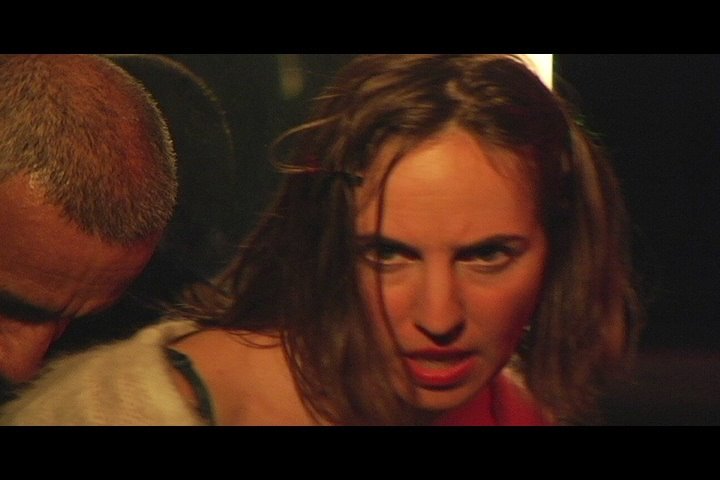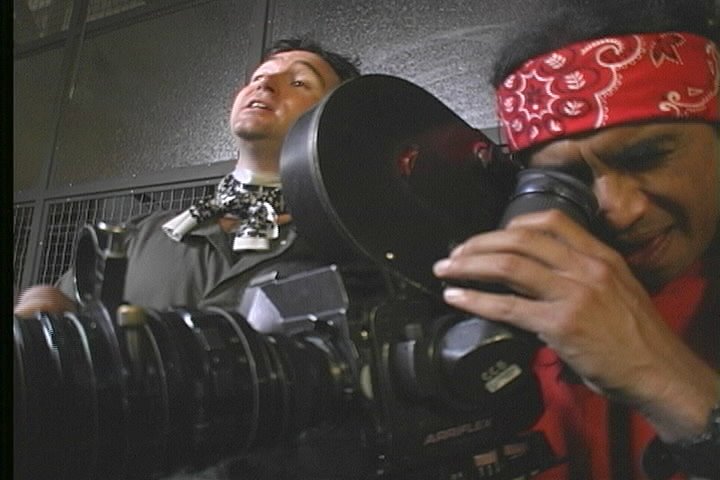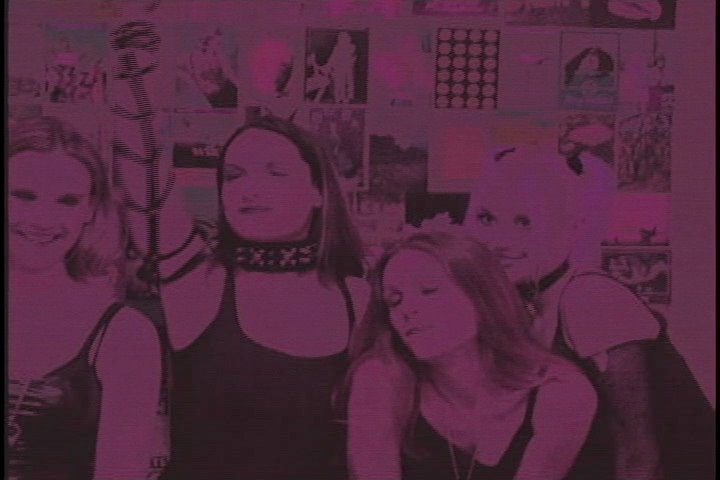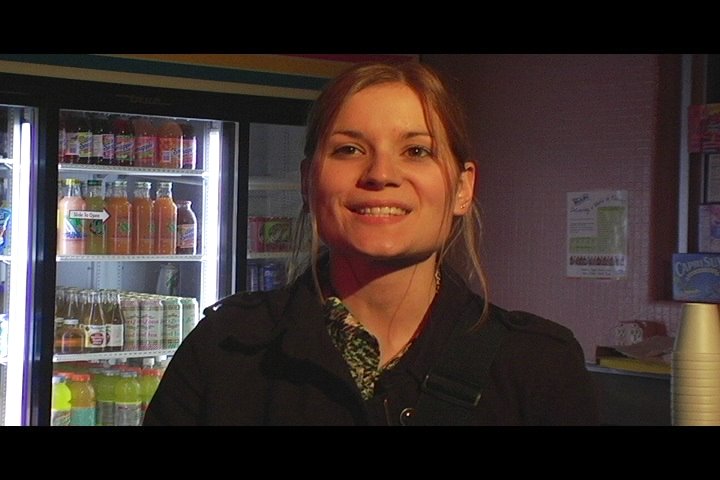John's shared items in Google Reader
Friday, December 22, 2006
Credit Problems (video)
I was talking with a friend and we discovered this place off of Adams Ave. We couldn't resist.
This is starring Adam Weiner.
I guess a question to you is, what would such an organization be in charge of? I'm honestly all for elevating women. I consider myself a feminist. No, not womanizer, feminist. I believe in equal treatment.
Further, "California Federal"?
Anyway, it disturbed me that this showed up as a related video:
Even though it's obviously a joke. Though a possibly dangerous one.
Monday, November 27, 2006
Lost should set an exit strategy
Lost should set a date for withdrawal Variety says.
Just a note - The model of American Television is that a show last as long as possible. This has been contrary to a) how Lost has been planned (the writers say about 5 seasons long), and b) the plea from this article.
Interesting.
Just a note - The model of American Television is that a show last as long as possible. This has been contrary to a) how Lost has been planned (the writers say about 5 seasons long), and b) the plea from this article.
Interesting.
Studio 60
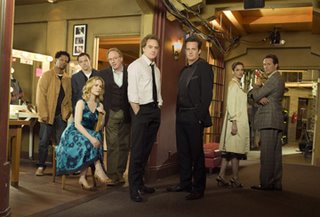
"Okay, tell the writers' room they're gonna have to stretch it another twenty-five seconds and I'm sure that making it longer was the missing ingredient in making it funny." -- Cal Shanley, Studio 60
Studio 60 pushes this idea by using the behind-the-scenes stage to be more topical. It's a stage for the Christian Harriet Hayes to face off against former lover and diametrically opposed Liberal satirist, Matt Albie, for ultra-capitalist by-the-numbers CEO Jack Rudolph to lord over idealistic network president Jordan McDeere as she champions higher quality television. You could call it, as Matt Albie does, the cast of a Fellini film. You can, of course, if you were just as pretentious and you know who Fellini, Paddy Chayevski, and the Hollywood Ten are. Which is precisely what I like about it. In a non-condescending way (despite John Goodman's Judge Rober Bebe's statement), it expects a lot out of its viewers, and it doesn't dumb it down. I always wonder why people don't find dumbing down a drama in order to reach more viewers to be more condescending, but I suppose that's just me. Though it is difficult hearing Amanda Peet's exposition for TV jargon TV producers should already know.
As I've been working in live TV for these last six months, I have to say that's likely one of the reasons I love this show. It's still a fantastic reality put into the behind the scenes world of TV - not unlike what Network did years ago. Like live TV, commentators only read off teleprompters and become self-conscious about their makeup, the control room is full of people reading magazines and watching baseball games rather than pay attention to what's going on on stage, actors squabble, writers slack off, and good producers take the ridiculousness reality hands them (mostly) in stride (Simon: Tom's been arrested because he assaulted some gay guys who were assaulting Harriet, but the computer coughed up an old warrant so he's on his way to Parump, Nevada, but he's wearing my jacket and when they search him they're going to find my joint in his pocket. Danny: Seriously, is this a sketch? Simon: No it's not, where've you been? Danny: BREAKFAST!).
Every actor in this series is giving their finest performance of their careers. It isn't the cast of "The West Wing", but it's close. One of the show's toughest challenges is the success of Aaron Sorkin's last show. A show that, in fact, he didn't really want to do - it was a last minute pitch suggested by his friend Brad Whitford when he met with a few TV execs. Studio 60 is far more personal. Producer Danny Tripp, like Aaron Sorkin, had a recent public relapse of sobriety. Matt Albie, like Aaron Sorkin, has a former relationship with a right-wing Christian entertainer, like Kristen Chenoweth. Like Aaron Sorkin and partner Thomas Schlamme, Matt and Danny fight network execs for what they see as better quality television. And maybe, just maybe, that's the problem.
I spoke to a friend recently who loved this show initially, but's now worried that it's getting too smart for its own good. The two built in audiences for this project - West Wing fans and, by extention, SNL fans - would likely not be too receptive to this show. Saturday Night Live, while being the classic comedy show that it is, was never the stage for reflections on the Christian Right's hold on mainstream media, or other topical issues like gay marriage, and the threat of terrorism. Further, the SNL-like show that Studio 60 don't have the stakes as high as they were in "The West Wing". What could a somewhat popular late night variety show do that even compares to this nation's president? Then again, that is exactly the question Studio 60 poses. To paraphrase Paddy Chayevsky - it's the most powerful propaganda force on Earth.
While the media is supposedly run by liberals, but as Steven Weber's brilliant Jack Rudolph says, "The media isn't run by liberals, it's run by money, stockholders that hold me accountable." The show began with Judd Hirsch's powerful monologue pleading for higher-quality television. While many reviewers interpreted this as a by-gone thought, they forgot the second half of that monologue - higher quality television inspite of commerce. The Christian Right's hold on networks and advertisers? Money. Dollars and cents. The Bottom Line. This is a show about the business of entertainment, and everything else that plays into it. When a star has an opinion on gay marriage, it takes dollars away. With the mix of personalities that is the "Cast of a Fellini Film" that Matt Albie endearingly refers to it as, it becomes this battleground of Red vs. Blue, Art vs. Commerce, small-town vs. large-town, atheist vs. believer, and lover vs. ex-lover.
Funny though, the reason NBC picked up the full season with declining ratings was built right into the show - Studio 60 has the highest viewing audience of households with an income of $75,000 or more. High art apparently means high class, which means high class buyers, which means high class money. "Heroes" was probably not the best lead in show for "Studio 60".
30 Rock

"30 Rock" isn't a serial drama, but it must be mentioned in the same breath as "Studio 60". It's Tina Fey's lighter, funnier, more self-deprecating answer to the wittier, more personal labor of love by Aaron Sorkin. So I'll do 30 Rock first, since I find it so funny. Thus far, there is no episode I haven't liked. I don't compare it to any other show (especially "Curb Your Enthusiasm") because it is a unique and clever animal in and of itself. What you've probably heard - Alec Baldwin and Tina Fey are hilarious. Tracy Morgan, not so great. Especially if you don't get Tracy Morgan's brand of humor. However, NOT getting Tracy Morgan's brand of humor IS the humor behind the humor of the show. He's the unfunny unprofessional insane front man for a show re-imagined by a corporate drone.
Alec Baldwin's "VP of Television and Microwave Programming" Jack Donaghy says things like "Pos-Refs", and "Sorry I'm late, I was just at Anne Coulter's 60th birthday party, beautiful girl," but you still like him. He may be able to point out every one's flaws and background with the pinpoint accuracy of a magician doing a fortune-teller act. When he can't read the young, folkish NBC Page Kenneth (of the famous NBC Page program where people like Ted Koppel and Michael Eisner got their starts) at a poker game, he obsesses over it, even telling Tina Fey's Liz Lemon, "We'll all be working for him in 10 years." Still, as the show progresses, Jack Donaghy shows that all his antics come from a genuine care for his job and position. He sincerely believes that everything he does is helping the show, and NBC in general. Alec Baldwin plays that sincerity up, without a hint of not liking the character himself. Which is why when Jack Donaghy spills out right wing corporate dogma, you can't even see Alec Baldwin cringe on the inside.
Still, the main strength of the show is its writing - in detail. While taking on the seriousness of corporate layoffs, enforced product placement (NBC must have actually put a program in effect because all their shows riffed on this at the same time), truly emotionally available (as emotionally available as television writers and stars can be) three-dimensional characters take the stage. Donaghy is not just a corporate pointy-haired boss, Jordan isn't just a prima donna insane star, and Liz Lemon stands up for her artistic values while never taking herself too seriously. Hell, nothing is taken too seriously -- every act is layered with David Zucker-like background action. The intercom calls for things one would never hear in this reality - "Ghost-Face Killa to the stage please, for 'Muffintop'", an extra dressed as a Snapple bottle randomly walks into a scene about product placement, and a cat trainer who hates cats and the crazy cats who nearly bludgeon the shows former star.
Thursday, November 23, 2006
Odd Marketing Terminology
Last I checked, the purpose of marketing is communicating and, therefore, selling. I came across a particularly funny marketing term in a job search - "MARCOM" (which, I'd regrettably never heard before). MARCOM is an abbreviation for "marketing communications." Marcom is targeted interaction with customers and prospects using one or more media, such as direct mail, newspapers and magazines, television, radio, billboards, telemarketing, and the Internet. A marketing communications campaign may use a single approach, but more frequently combines several.
In other words, "Marcom" (or, sometimes "Marcomm") means marketing. Or, more to the fact, MARCOM is a very poor way of communicating "marketing communications".
Pos-Mens, which was introduced as a joke word (much like "truthiness" and "wikiality") on "30 Rock", is finding its own place. I highly recommend watching this weeks "30 Rock" on NBC.com before it gets replaced by tonight's show tomorrow. Pos-Mens is a term for "Positive Mentions", product placement in which a character "purchases and is satisfied with" a particular product.
*disturbing note - More interesting is that both "30 Rock" and "Studio 60" have an episode about product placement and company layoffs in the same week that NBC announced its own layoffs. Topical, though it wasn't meant to be. Both episodes were filmed a few weeks ahead of time. Even further, NBC bought more episodes of both shows, despite declining raitings.
In other words, "Marcom" (or, sometimes "Marcomm") means marketing. Or, more to the fact, MARCOM is a very poor way of communicating "marketing communications".
Pos-Mens, which was introduced as a joke word (much like "truthiness" and "wikiality") on "30 Rock", is finding its own place. I highly recommend watching this weeks "30 Rock" on NBC.com before it gets replaced by tonight's show tomorrow. Pos-Mens is a term for "Positive Mentions", product placement in which a character "purchases and is satisfied with" a particular product.
*disturbing note - More interesting is that both "30 Rock" and "Studio 60" have an episode about product placement and company layoffs in the same week that NBC announced its own layoffs. Topical, though it wasn't meant to be. Both episodes were filmed a few weeks ahead of time. Even further, NBC bought more episodes of both shows, despite declining raitings.
Sunday, September 24, 2006
Karen Walker and the Mortician website up!

The first ish is still a couple of months away, but I put up the website. It's a blogger site, but it'll work for my purposes. Some artwork can be seen there.
Further, a new cafe press merchandise site has been put up for your enjoyment.
Tuesday, September 19, 2006
Lev Grossman and Ed Champion: Mortal Enemies?
For those of you not aware, a long time friend and compatriot named Edward Champion maintains a literary-themed blog at Edrants.com. Ed has been a great friend over the last couple of years, and we've even written a few things together. Though as his success rises, some people cannot help but make things more difficult for him.
Lev Grossman of Time editorial, has actually come under fire from Ed Champion several times before. If, by under fire, you mean lighthearted and sarcastic quips here and there. Apparently, he's taken notice, and given Ed and his blog some much needed publicity (yes, it's the same links from the above paragraph). Albeit "bad".
It's actually fun to see writers help others, even in indirect ways.
For other writer blogs, I recommend: Saheli Datta, Matt Schwartz (who's site 1001 insomniac nights has since ended) and Sara Harvey. At least. These are people I've known a long time that are actually working professional writers now. I'm proud of them.
Lev Grossman of Time editorial, has actually come under fire from Ed Champion several times before. If, by under fire, you mean lighthearted and sarcastic quips here and there. Apparently, he's taken notice, and given Ed and his blog some much needed publicity (yes, it's the same links from the above paragraph). Albeit "bad".
It's actually fun to see writers help others, even in indirect ways.
For other writer blogs, I recommend: Saheli Datta, Matt Schwartz (who's site 1001 insomniac nights has since ended) and Sara Harvey. At least. These are people I've known a long time that are actually working professional writers now. I'm proud of them.
Saturday, September 16, 2006
General Announcement: KAREN WALKER and the MORTICIAN
Karen Walker's world is going to change, and only one man will help her.

For more art, go to the cafe press store.
In other news:
I finally got my scanner, freeing me up to do all of this work I've been planning on. Look for more updates. Karen Walker, Children of War, White Magic, and Chinaman's Chance are going to soon be up on Blogger. Since that has the most ease. I'm also going to try doing pseudoanimation for internet videos.
Friday, September 15, 2006
Upcoming Films for the Religious Audience
Take a look at Facing the Giants and Conversations with God.
I'm not criticizing the release of these films, but it does feel like a change. They'll likely be distributed arthouse theatres, bringing in a different audience than "traditionally" comes in. Both are distributed by the Samuel Goldwyn Co., which seems to bring a wide range of voices to the screen. They also released the highly controversial What the Bleep Do We Know?, a film about the "spiritual" side of science, which drew protest from the mainstream scientific community, and the more recent hit, The Squid and the Whale. When I say "wide range of voices" - take a look at Bobcat Goldwhait's Sleeping Dogs Lie.
There is a large perception that Jews and Liberals control Hollywood. Samuel Goldwyn, in fact, was one of the many jewish men pointed to in order to prove this.
It seems to me that the media follows the money. There is an audience for everything. "Passion" and "The Chronicles of Narnia" proved that there is a large Christian audience. I wonder if these films, which were picked up by the Goldwyn Co. at festivals and the like, were responses to that. Variety has this article on how these new niche markets are shaping up.
I'm not criticizing the release of these films, but it does feel like a change. They'll likely be distributed arthouse theatres, bringing in a different audience than "traditionally" comes in. Both are distributed by the Samuel Goldwyn Co., which seems to bring a wide range of voices to the screen. They also released the highly controversial What the Bleep Do We Know?, a film about the "spiritual" side of science, which drew protest from the mainstream scientific community, and the more recent hit, The Squid and the Whale. When I say "wide range of voices" - take a look at Bobcat Goldwhait's Sleeping Dogs Lie.
There is a large perception that Jews and Liberals control Hollywood. Samuel Goldwyn, in fact, was one of the many jewish men pointed to in order to prove this.
It seems to me that the media follows the money. There is an audience for everything. "Passion" and "The Chronicles of Narnia" proved that there is a large Christian audience. I wonder if these films, which were picked up by the Goldwyn Co. at festivals and the like, were responses to that. Variety has this article on how these new niche markets are shaping up.
Monday, September 11, 2006
"I Took Your Penguin"
Bassist Frank tells us a story about how this one time he took this girl's penguin.
Yes, I'm aware that's grammatically incorrect.
Yes, I'm aware that's grammatically incorrect.
Thursday, September 07, 2006
Wednesday, September 06, 2006
Tuesday, September 05, 2006
"Is it Gone" - Parody of emo rock
Bassist Frank takes a turn as lead singer/"songwriter", adapting a friend's angst-ridden poem into, well, something else:
Monday, September 04, 2006
"A Little Less Conversation" / "Jump Around"
A little change of pace. Here's a cover that "Stir-Fry Rattlesnake" did, well a cover of two songs. It's their open. I like it.
Friday, September 01, 2006
Thursday, August 31, 2006
"Just Cause"
Here's a bit of a documentary series I'm about to do on starving artists. They broke out the guitar and the poem, I broke out the camera, and this is what we came up with.
Monday, August 28, 2006
Stars do not a movie make?
Here's a New York Times article, discussing how stars don't have as much of an affect on films as originally thought.
Saturday, August 26, 2006
More from Stir-Fry Rattlesnake, live @ Twigg's
This is one of the projects I'm working on right now.
Tuesday, August 15, 2006
How many times a google for which Google can sue you?
Take a look at this.
I know this is the parent company of this blog company, and so I'm just presenting the article itself without commentary. Actually, I understand the need to protect ones own name. I wonder whether this particular group of lawsuits goes deeper.
I know this is the parent company of this blog company, and so I'm just presenting the article itself without commentary. Actually, I understand the need to protect ones own name. I wonder whether this particular group of lawsuits goes deeper.
Tuesday, August 08, 2006
Tuesday, August 01, 2006
Spectacle vs. Story: reflections on the buzz for "A Scanner Darkly"
This isn't a review, just a comment. I wasn't sure whether I wanted to see this film,
Though I was both a Philip K. Dick fan and Richard Linklater fan, though not necessarily a fan of Keanu Reeves' acting (though I must say that I do think he's an excellent person). Anyway. I watched the first 24 minutes over at IGN.com, and I was drawn in. The story is fascinating to me, and the loyalty to the original novel is definately there (unlike that John Woo film from a few years ago). Still every interview and almost every review I've read so far about the film has been about the rotoscoping technique. Not the story.
It's a fascinating technique. I've done literal rotoscoping before and the imagery you can get is amazing. Great. We know that. We can see that.
What's the story? Why do we want to see it? Who is everyone, outside of just looking like painted pictures?
Technique and style are tools, not the story in and of itself.
Movie culture seems to be making an interesting transition from being about storytelling to being about the effects and the tools surrounding them. DVD featurettes serve as masked magicians, revealing the secrets behind the spectacle, forgetting the wonderful narrative in which we are presented. People want to know how much a movie costs to make, what kind of technology is involved, and whether it'd look good on their high def 65" screen.
Most interestingly, in recent years, a lot of movies have been using effects to tell the story more effectively than in the early days of CGI. Spider-man I and II, X-2, and Pirates of the Carribean are great examples of this. But also take, for example, The Road to Perdition, which used computer effects and subtle processes to help us believe we're in Depression-era Chicago. Lately, these tools have found their use amongst all aspects of the industry and how we tell a story, from something as wide-ranging as placing Russell Crowe in a green room and making us believe he's in the now-ruined Colliseum to digitally enhancing imperfections in lead actors and actresses.
There are less than 7 minutes of CGI shots in Jurassic Park, which supposedly started this revolution. Compare that to now.
Back to A Scanner Darkly.
Within the first 5 minutes I'm launched into this world, and while I know the rotoscoping has a lot to do with that, for the scope of the movie I'm not interested in how it's done. It's just there. It's a rich painting full of color and substance, and bugs growing out of a drug addicts hair. The blur of the scramble suit intrigues me and scares me at the same time. The infringement of the drug world onto a world that doesn't truly care about its victims (represented by the Bear Club Lodge) brings me further. The conspiracy theories about blue flowers, drug terrorists (a nod to a few cold war references from the novel in which the U.S.S.R. was one of the suspects), and cultish rehab clinics has me on the edge of my seat, my eyes pressed against the laptop. Finally, at the reveal that Robert Arcter/Agent Fred is supposed to spy on himself that's where I find my story. Diverted, of course, by a discussion about an 18-speed/9-speed/8-speed mountain bike that may or may not be hot.
Then I go to interviews with actors and the director. I want to hear about why they wanted to tell this story, how they wanted to tell this story. Our culture is becoming more and more aware of addiction and its effects on its victims and the world, but it's still contraversial. What hurdles did they have to go through to tell this story.
And all of the questions are about rotoscoping. And how actors reacted to the rotoscoping process. The process. Tell us about the process.
I wanted to make a rotoscoped film once.
Still do.
It was called "Penny Royalty". It was an animated musical following the career and life of Kurt Cobain. I worked on a script, working on an angle. Most of the time I found myself lost in technique and not in the substance of the story. And really, haven't we heard that story already by now?
Then I saw with "Waking Life" how possible it was. Further "American Pop" really summarized the look of it.
The reason for the look, the effect on the viewer, the beauty of the image, can all be seen in that first 24 minutes. It's great.
What makes those 24 minutes compelling though, is the acting and script. That's what makes it all work.
In my opinion, of course.
Though I was both a Philip K. Dick fan and Richard Linklater fan, though not necessarily a fan of Keanu Reeves' acting (though I must say that I do think he's an excellent person). Anyway. I watched the first 24 minutes over at IGN.com, and I was drawn in. The story is fascinating to me, and the loyalty to the original novel is definately there (unlike that John Woo film from a few years ago). Still every interview and almost every review I've read so far about the film has been about the rotoscoping technique. Not the story.
It's a fascinating technique. I've done literal rotoscoping before and the imagery you can get is amazing. Great. We know that. We can see that.
What's the story? Why do we want to see it? Who is everyone, outside of just looking like painted pictures?
Technique and style are tools, not the story in and of itself.
Movie culture seems to be making an interesting transition from being about storytelling to being about the effects and the tools surrounding them. DVD featurettes serve as masked magicians, revealing the secrets behind the spectacle, forgetting the wonderful narrative in which we are presented. People want to know how much a movie costs to make, what kind of technology is involved, and whether it'd look good on their high def 65" screen.
Most interestingly, in recent years, a lot of movies have been using effects to tell the story more effectively than in the early days of CGI. Spider-man I and II, X-2, and Pirates of the Carribean are great examples of this. But also take, for example, The Road to Perdition, which used computer effects and subtle processes to help us believe we're in Depression-era Chicago. Lately, these tools have found their use amongst all aspects of the industry and how we tell a story, from something as wide-ranging as placing Russell Crowe in a green room and making us believe he's in the now-ruined Colliseum to digitally enhancing imperfections in lead actors and actresses.
There are less than 7 minutes of CGI shots in Jurassic Park, which supposedly started this revolution. Compare that to now.
Back to A Scanner Darkly.
Within the first 5 minutes I'm launched into this world, and while I know the rotoscoping has a lot to do with that, for the scope of the movie I'm not interested in how it's done. It's just there. It's a rich painting full of color and substance, and bugs growing out of a drug addicts hair. The blur of the scramble suit intrigues me and scares me at the same time. The infringement of the drug world onto a world that doesn't truly care about its victims (represented by the Bear Club Lodge) brings me further. The conspiracy theories about blue flowers, drug terrorists (a nod to a few cold war references from the novel in which the U.S.S.R. was one of the suspects), and cultish rehab clinics has me on the edge of my seat, my eyes pressed against the laptop. Finally, at the reveal that Robert Arcter/Agent Fred is supposed to spy on himself that's where I find my story. Diverted, of course, by a discussion about an 18-speed/9-speed/8-speed mountain bike that may or may not be hot.
Then I go to interviews with actors and the director. I want to hear about why they wanted to tell this story, how they wanted to tell this story. Our culture is becoming more and more aware of addiction and its effects on its victims and the world, but it's still contraversial. What hurdles did they have to go through to tell this story.
And all of the questions are about rotoscoping. And how actors reacted to the rotoscoping process. The process. Tell us about the process.
I wanted to make a rotoscoped film once.
Still do.
It was called "Penny Royalty". It was an animated musical following the career and life of Kurt Cobain. I worked on a script, working on an angle. Most of the time I found myself lost in technique and not in the substance of the story. And really, haven't we heard that story already by now?
Then I saw with "Waking Life" how possible it was. Further "American Pop" really summarized the look of it.
The reason for the look, the effect on the viewer, the beauty of the image, can all be seen in that first 24 minutes. It's great.
What makes those 24 minutes compelling though, is the acting and script. That's what makes it all work.
In my opinion, of course.
"...about me, accurately, and with a better vocabulary."
Sure, it's a Will Ferrell movie. But look at the cast.
http://www.sonypictures.com/movies/strangerthanfiction/index.html
Also, this is being talked about as Will Ferrell's "The Truman Show" and "Good Morning Vietnam"
http://www.sonypictures.com/movies/strangerthanfiction/index.html
Also, this is being talked about as Will Ferrell's "The Truman Show" and "Good Morning Vietnam"
Monday, July 17, 2006
John M. Osborne Video Reel
Here's a rough draft of my latest reel. The full one will be done on Tuesday. Any suggestions?
Saturday, July 15, 2006
Subscribe to:
Posts (Atom)





